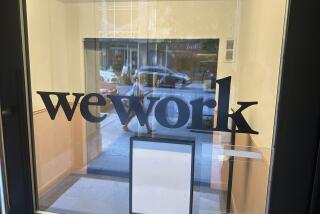Wheeling Files for Reorganization : Steel Firm Unable to Strike Deal With Lenders, Union
- Share via
Unable to hammer out concession agreements with its lenders and unionized workers, Wheeling-Pittsburgh Steel, the nation’s eighth-largest steelmaker, Tuesday sought court protection from its creditors under Chapter 11 of the U.S. Bankruptcy Code.
Filing of the voluntary reorganization petition, which came after years of massive losses for Wheeling-Pittsburgh, was widely seen by industry observers as further evidence that the shrinkage of the troubled domestic steel industry is continuing.
Suffering from high labor costs, severe price discounting, excess capacity and fierce competition from cheap imports despite the Reagan Administration’s efforts to impose quotas on foreign steel, the industry appears poised for further dramatic cutbacks in production and employment, and most analysts are anticipating a new wave of mergers and joint ventures among the nation’s major steel producers.
Wheeling-Pittsburgh officials promised Tuesday that the firm would remain in business and continue operating its nine plants in Pennsylvania, West Virginia and Ohio while it tries to put together a court-approved reorganization plan. But they blamed the United Steelworkers for forcing the company into bankruptcy proceedings by withdrawing from an agreement on wage concessions that was crucial to the success of the firm’s negotiations with its 24 creditors, who were owed $500 million.
The company, which employs 10,000 workers, said union officials had agreed to wage concessions that would have reduced Wheeling-Pittsburgh’s average hourly labor costs by $2 per hour but backed out of the deal because they were unhappy with the terms of the company’s agreement with its creditors. That agreement, according to the company, would have allowed it to defer payments on its loans and enable it to obtain new loans in exchange for liens on its inventories and other assets.
But the union hotly denied that it was to blame for Wheeling-Pittsburgh’s bankruptcy filing.
Paul Rusen, director of United Steelworkers District 23 and chief negotiator for the union, said Wheeling’s charge was “totally asinine. The banks are the ones that forced this bankruptcy.”
A financial adviser to the union, who asked not to be identified, said “the union made every effort it could” to avert the bankruptcy. He said the deal fell apart because the union and the banks had a fundamental difference over how to solve Wheeling’s current problems.
The adviser and Rusen both said they were opposed to the company’s plan to allow the banks to take a lien on its current assets (meaning products such as flat-rolled steel, as opposed to fixed assets such as equipment).
The adviser said Wheeling-Pittsburgh Chairman Dennis J. Carney had told the union earlier that he would not mortgage the firm’s assets because that would leave the company financially vulnerable to another downturn.
Last week, the source said, Rusen and Carney struck a deal--the union would make wage and benefit concessions amounting to $2 an hour for the next year, lowering the total package from $21.50 to $19.50. He said the concessions for the second year would have been $1.50 per hour, lowering the total to $20 an hour. (The typical union worker at Wheeling-Pittsburgh now earns $12.50 an hour in wages, plus $9 an hour of benefits.) In return, the unionized workers--who had already provided the company with $102 million worth of concessions in 1982 and 1983--would have received preferred stock.
Carney had told the union that he was seeking only a debt restructuring from the banks. But in a meeting with Carney last Friday, the bankers insisted on a lien against all of the firm’s current assets to cover their debts. Carney agreed to the demand, but the union balked.
Rusen said he still expects that the union will be able to open new negotiations with the company to “reach a new labor agreement and to bring out a strong, viable company.”
Rusen said the union will ask for a seat on Wheeling’s board, preferred stock that is convertible to common and for other benefits, including protection for retiree pension programs and retiree insurance.
As one of the smallest of the nation’s major integrated steel producers, Wheeling-Pittsburgh has not had the resources of its larger competitors to weather the depression that has plagued the industry in the early 1980s. Imports, which accounted for 29.1% of the market in the first two months of 1985, have eroded many of the company’s traditional markets, while the slump in the energy business has forced it to idle its oil-related tube mills.
The company has lost money since 1980, and it estimates that it lost another $54 million last year, despite a pickup in orders for its automotive sheet steel, which is one of Wheeling-Pittsburgh’s most important products.
Those losses also have come despite an expensive modernization program that now enables Wheeling-Pittsburgh to produce a relatively large percentage of its steel through the highly efficient continuous casting method, which is widely used in Japan and other low-cost steel-producing nations. In fact, the debt burden imposed by the expansion program proved too much for the company, since steel demand has never recovered enough to enable Wheeling-Pittsburgh to pay for its capital programs.
Analysts now believe that Wheeling-Pittsburgh’s dilemma proves that domestic steel firms may be following the wrong course by trying to buy their way out of the slump by investing in expensive, high-tech mills instead of by reducing unnecessary capacity.
More to Read
Inside the business of entertainment
The Wide Shot brings you news, analysis and insights on everything from streaming wars to production — and what it all means for the future.
You may occasionally receive promotional content from the Los Angeles Times.










